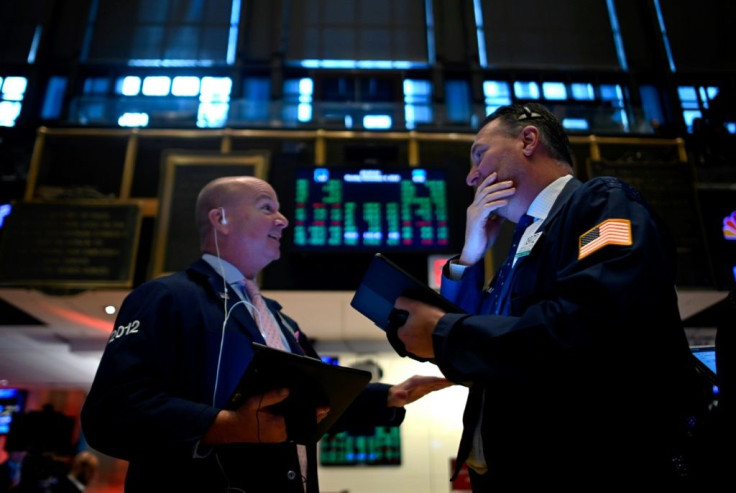Wednesday's Stock Market Close: Stocks Fall On Lack Of Progress On China Trade Deal, Fed Hints No New Rate Cuts

U.S. stock indexes fell on lack of any progress on a trade deal with China and suggestions by the Federal Reserve that it is unlikely to cut interest rates any time soon.
The Dow Jones Industrial Average dropped 114.08 points to 27,819.94 while the S&P 500 lost 11.79 points to 3,108.39 and the Nasdaq Composite Index dropped 43.93 points to 8,526.73.
Volume on the New York Stock Exchange totaled 3.1 billion shares with 1,288 issues advancing, 92 setting new highs, and 1,677 declining, with 85 setting new lows.
Active movers were led by Cancer Genetics (CGIX), Kazia Therapeutics (KZIA), Aravive (ARAV), Kiniksa Pharmaceuticals (KNSA) and NeuBase Therapeutics (NBSE).
Reuters reported a “phase 1” U.S.-China pact may not occur until next year as Beijing officials push for more extensive tariff reductions. President Trump has been threatening to hike tariffs in the absence of a trade deal.
Chinese officials were also angered by U.S. Senate passage of a bill on Tuesday in support of human rights in Hong Kong. Beijing has vowed “strong countermeasures” if the bill is approved by the House, as well.
In minutes from the last Federal Open Market Committee meeting in late October, Fed officials said they would refrain from more interest rate cuts unless the economy changes suddenly.
Last month, the central bank cut the benchmark overnight lending rate to a range of 1.5% to 1.75%, the third such decrease of the year. Most board members viewed this easing as sufficient “to support the outlook of moderate growth, a strong labor market, and inflation near the committee’s symmetric 2% objective.”
This rate policy “likely would remain” in place “as long as incoming information about the economy did not result in a material reassessment of the economic outlook,” the central bank said.
The Fed added, however, that “policy was not on a preset course and that they would be monitoring the effects of the committee's recent policy actions, as well as other information bearing on the economic outlook, in assessing the appropriate path of the target range for the federal funds rate.”
Lael Brainard of the Federal Reserve board told CNBC she thinks the U.S. economy will expand moderately through 2020. “In terms of the domestic economy, again, powered by the consumer, I do expect to see trend, of above-trend growth, actually continuing out over the course of the next year, year-and-a half,” she said.
Overnight, Asian markets finished lower with Shanghai Composite falling 0.78%, the Hong Kong's Hang Seng off 0.75% and Japan's Nikkei 225 down 0.62%.
European markets finished broadly lower as the FTSE 100 fell 0.84% while Germany's DAX dropped 0.48% and France's CAC 40 slipped 0.25%.
The Energy Information Administration reported U.S. crude supplies climbed by 1.4 million barrels for the week ended Nov. 15, marking the fourth straight week of such gains.
The Mortgage Bankers Association said mortgage loan applications decreased by 2.2% while refinance applications fell 8% for the week.
Crude oil futures were down 3.08% to $56.91 per barrel and Brent crude stayed unchanged at $62.40. Gold futures were down 0.11%.
The euro was down 0.03% to $1.1077 while the pound sterling slipped 0.04% to $1.2921.
The yield on the 10-year Treasury fell 2.69% to 1.738% while yield on the 30-year Treasury dropped 2.31% to 2.203%.
© Copyright IBTimes 2025. All rights reserved.





















